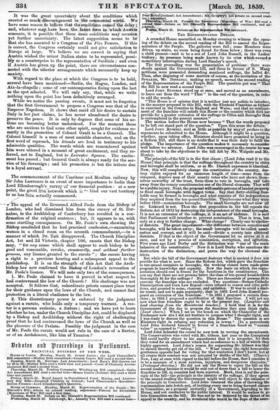ihe appeal of the Reverend Alfred Poole from the Bishop
of London, who had dismissed him from the curacy of St. Bar- nabas, to the Archbishop of Canterbury has resulted in a con- firmation of the original sentence ; but, it appears to us, with some startling consequences. On Mr. Poole's own showing the Bishop concluded that he had practised confession,—examining women in a closed room on the seventh commandment,—in a manner of which Dr. Tait disapproved. The Church Discipline Act, 1st and 2d Victoria, chapter 106, enacts that the Bishop may, " for any cause which shall appear to such bishop to be good and reasonable, revoke, summarily, and without further process, any licence granted to the curate " ; the curate having a right to a previous hearing and a subsequent appeal to the Archbishop. It is on the strength of this Act that the Arch- bishop has now confirmed the Bishop of London's revocation of Mr. Poole's licence. We will note only two of the consequences.
1. Mr. Poole claimed to have it proved in what respect he had contravened the law of the Church ? His challenge was not accepted. It follows that, subordinate priests cannot place trust for their guidance upon the laws of the Church, and cannot find protection in a literal obedience to the laws 2. This discretionary power is enforced by the judgment against a curate, who holds only a temporary warrant. A rec- tor is a persona ecolesise, a fixture ; and we have yet to learn whether he too, under the Church Discipline Aet, could be displaced by a Bishop and Archbishop without the right of challenging proof that he had contravened the laws of the Church as well as the pleasure of the Prelate. Possibly the judgment in the case of Mr. Poole the curate would not rule in the case of a Rector, or of an Archdeacon, like him of Taunton ?


























 Previous page
Previous page